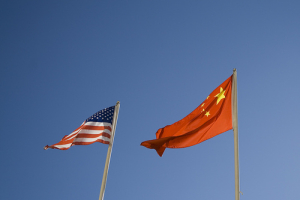A new Pew survey of people in 39 countries from around the world finds that people tend to have a more favorable view of the United States than they do of China, but with wide variations across regions and countries, according to The Washington Post.
It’s a compelling dataset, a sign of shifting global attitudes toward two of the world’s most powerful countries and a glimpse into the complex world of public opinion toward China and the United States.
“The United States remains much more popular with its many allies from Europe to Asia,” writes Max Fisher for The Washington Post. “The most strongly U.S.-leaning country, according to the data, is Japan, followed by, in this order: Italy, Israel, the Philippines and South Korea. All five are military allies.”
Most of the countries that report a higher favorability for China are Muslim-majority, The Washington Post reports. This appears to be due in part to low approval for the United States, particularly in the Arab Middle East.
“In some cases, it’s also about positive views toward China, which scores a remarkably high 81 percent favorability in both Malaysia and Pakistan. But in others, such as Turkey and Jordan, China scores poorly, just not as poorly as the United States,” he writes. “Broadly, these numbers seem driven less by a love of China than a dislike of America, something for U.S. policymakers to keep in mind.”
China’s economic power is on the rise, and many think it will eventually supplant the United States as the world’s dominant superpower, according to pewglobal.org.
However, China’s increasing power has not led to more positive ratings for the People’s Republic. Overall, the U.S. enjoys a stronger global image than China. Across the nations surveyed, a median of 63 percent express a favorable opinion of the U.S., compared with 50 percent for China.
“Globally, people are more likely to consider the U.S. a partner to their country than to see China in this way, although relatively few think of either nation as an enemy,” according to pewglobal.org. “America is also seen as somewhat more willing than China to consider other countries’ interests. Still, both of these world powers are widely viewed as acting unilaterally in international affairs.”
By a wide margin, the Japanese give China its worst ratings – only 5 percent express a positive view, according to pewglobal.org. Territorial disputes have increased tensions between these two historic rivals over the past few years, and 82 percent of Japanese describe these disputes as a big or very big problem.
“Territorial frictions with China are also considered major problems in South Korea and the Philippines, although unlike Japan, South Koreans and Filipinos are divided in their overall assessments of China,” reports pewglobal.org. “Even though roughly seven out of 10 Australians (71 percent) are concerned about the growing strength of the People’s Liberation Army, a majority (58 percent) nonetheless has a favorable opinion of China, their country’s largest trading partner.”
The study was recently released by Richard Wike and Bruce Stokes at the Pew Research Center. Read more about it at: http://www.nytimes.com/interactive/2013/07/18/world/asia/18china-us-relations-documents.html?ref=asia&_r=1&


















